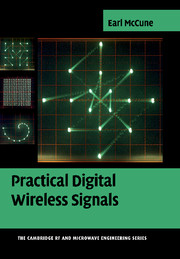Book contents
- Frontmatter
- Contents
- Preface
- Definitions and acronyms
- Terminology and notation
- 1 Keying, states, and block diagram construction
- 2 Common issues and signal characterization
- 3 Important details on results from Shannon, Nyquist, and others
- 4 Digital amplitude modulation (ASK)
- 5 Digital frequency modulation: FSK
- 6 Digital phase modulation: PSK
- 7 Combined digital modulations: QAM and OFDM
- 8 Spread spectrum
- 9 Wireless propagation and antenna fundamentals
- 10 Principles of coding
- 11 Multiple access techniques
- 12 Signal tradeoffs and system evolution
- Tutorial Appendices
- Index
- References
6 - Digital phase modulation: PSK
Published online by Cambridge University Press: 04 August 2010
- Frontmatter
- Contents
- Preface
- Definitions and acronyms
- Terminology and notation
- 1 Keying, states, and block diagram construction
- 2 Common issues and signal characterization
- 3 Important details on results from Shannon, Nyquist, and others
- 4 Digital amplitude modulation (ASK)
- 5 Digital frequency modulation: FSK
- 6 Digital phase modulation: PSK
- 7 Combined digital modulations: QAM and OFDM
- 8 Spread spectrum
- 9 Wireless propagation and antenna fundamentals
- 10 Principles of coding
- 11 Multiple access techniques
- 12 Signal tradeoffs and system evolution
- Tutorial Appendices
- Index
- References
Summary
Signals and characteristics
The newest fundamental signal type to join the DWC pantheon is phase-shift keying (PSK). The reason for PSK's relatively tardy entry is easy to understand, however. As will be seen in detail later in Section 6.3, the signal quality required for successful generation is quite high, and the amount of information required for successful reception of a PSK signal is the greatest of these fundamental signal types. In the early decades of DWC this type of signal quality was beyond the state of the art, so ASK and FSK were used. As time and technology progressed, achieving the required signal quality became possible – and PSK began to be used.
Author's dilemma
In the logical signal progression being followed so far, one might expect that this discussion on PSK will focus on a DWC signal type that strictly modulates the signal phase parameter, just as ASK only modulates the amplitude parameter and FSK only modulates the frequency parameter. Indeed, this type of signal is possible, practical, and useful. Yet for a number of reasons this form of PSK, which we shall refer to here as “pure-PSK”, is almost never used.
Why this is so is a matter of speculation, and a speculation that I am eager to engage in. But what the great majority of signal designers call PSK is actually a special case of QAM (quadrature amplitude modulation). In the remainder of this text we shall refer to this form as “conventional-PSK”.
- Type
- Chapter
- Information
- Practical Digital Wireless Signals , pp. 160 - 184Publisher: Cambridge University PressPrint publication year: 2010



